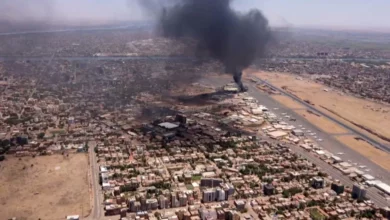Addis Ababa–Khartoum is ready to pull its troops out of the disputed Abyei region, a southern minister said, as US Secretary of State Hillary Clinton urged both sides to accept Ethiopian peacekeepers.
A new report from a Sudanese rights groups however accused the north of pursuing a genocidal campaign in the nearby region of South Kordofan.
"We have information that they have accepted to withdraw from Abyei as long as they agree on the specific arrangement with regards to the Abyei administration," South Sudan's Information Minister Barnaba Marial Benjamin told the independent Sudan Radio Service.
They were willing to discuss what forces would replace the north's Sudanese Armed forces (SAF), Benjamin said, adding: "I think they have accepted the principle that they have to withdraw."
Northern troops overran the flashpoint border district on 21 May, in response to an attack on a convoy of SAF troops and UN peacekeepers, prompting more than 100,000 people to flee, according to UN estimates.
Prior to arriving in the Ethiopian capital Clinton endorsed the idea of a peacekeeping force in Abyei and encouraged both sides to take up an Ethiopian offer of troops.
"The government of Sudan should urgently facilitate a viable security arrangement starting with the withdrawal of Sudanese Armed Forces," Clinton said, referring to the northern army.
"We would welcome both parties (north and south Sudan) agreeing to ask Ethiopia, which has volunteered to send peacekeepers, to do so as part of the UN mission," she said.
But Clinton had to cut short her visit to the Ethiopian capital for fear she would be stranded in Addis Ababa by the cloud of ash from a volcano in neighbouring Eritrea moving across the region.
She met briefly with a northern official and then with South Sudan President Salva Kiir before heading for the airport.
Clinton had originally intended to stay until Tuesday afternoon.
But she had not in any case planned to meet Sudan President Omar al-Bashir, wanted for genocide, crimes against humanity and war crimes by the International Criminal Court in The Hague.
Although Bashir refuses to recognize the court's authority, his travels have nevertheless been severely restricted.
Bashir and Kiir have been here since Sunday in talks aimed at resolving the crises in Abyei and another border region, South Kordofan, one month ahead of the south's independence.
Mediators described the talks as tense and by late evening discussions were still going on behind closed doors, with no information filtering out.
The talks came as the United Nations confirmed that the fighting of the past few days in volatile South Kordofan, the north's only oil-producing state, had spilled into the south.
"Fighting including bombardments and artillery shelling has been reported in 11 of the 19 localities in Southern Kordofan state, and has spread to Pariang County in Unity State, southern Sudan," the UN humanitarian office (OCHA) said.
Although South Sudanese officials have accused the northern army of having killed civilians in air strikes south of the border, UN sources had previously insisted the bombing was restricted to the border area.
UNICEF Sudan Representative Nils Kastberg said all sides in the various conflicts in Sudan had shown a "total lack of respect for international humanitarian principles."
Bashir and Kiir should "send a clear and unequivocal message – one that reaches all the way down to each and every soldier in the field – that the denial of humanitarian access constitutes a grave violation of human rights," he said.
But a six-page report released Monday by the Sudan Democracy First Group (SDGP) accused the northern Sudanese army of pursuing genocidal campaign in South Kordofan, targeting the indigenous Nuba peoples, help by militia forces.
The report said government forces were guilty of "a raft of crimes and human rights violations committed against the civilian population in Southern Kordofan/Nuba Mountains state."
South Sudan is to proclaim full independence on 9 July, under a peace deal after decades of conflict with the north, and the fighting threatens to overshadow the historic event, particularly if the southern army is drawn in.
The future status of Abyei remains the most sensitive issue dividing the two sides.




